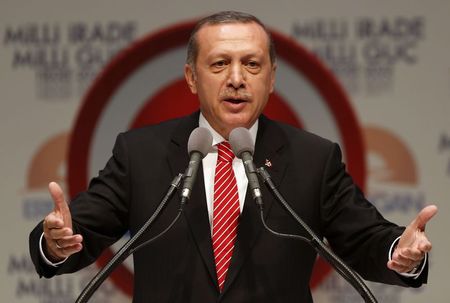Erdogan, launching presidential bid, vows ‘pioneering new Turkey’

By Humeyra Pamuk and Ece Toksabay
ISTANBUL (Reuters) – Tayyip Erdogan outlined his vision for a “pioneering new Turkey” on Friday, pledging to re-write the constitution, forge a more prominent role on the world stage and deepen democracy if he becomes the country’s first popularly-elected president.
Launching his campaign for an August election he is almost certain to win, the man who has dominated Turkish politics for more than a decade cast his bid for the presidency as part of a historic path of change, breaking the shackles of a status quo he said had held Turkey back for decades.
“The old Turkey is in the past now. The gates of the old Turkey are closed. People’s will to change has found its voice,” Erdogan, 60, told several thousand supporters in an Istanbul conference hall, in a speech lasting almost two hours.
“The new Turkey is a grown, developed and strong Turkey. The new Turkey will serve international peace better … The new Turkey will be grand and pioneering,” he thundered, his rhetoric characteristically impassioned, if short on detail.
The combative prime minister has endured one of the most challenging periods of his political career, facing down widespread anti-government protests and a corruption scandal over the past year, as well as contending with a deepening security threat posed by chaos in neighbouring Iraq and Syria.
His seemingly inevitable ascent to a presidency he says will be imbued with greater authority by the direct nature of the vote – previous incumbents have been chosen by parliament – has raised fears among his opponents that his autocratic instincts will only increase.
“The president is head of the family and shouldn’t be a man with a stick beating everyone over the head,” Erdogan’s main challenger Ekmeleddin Ihsanoglu, 70, said late on Thursday as he unveiled his strategy at a markedly more reserved event.
“It’s the 21st century. The times of foot whipping are long gone,” said Ihsanoglu, a former head of the Organisation of Islamic Cooperation who is the joint candidate for the CHP, the party of Mustafa Kemal Ataturk, founder of the modern secular Turkish state, and of the nationalist MHP.
Two polls late last month suggested Erdogan would comfortably win the election in the first round on Aug. 10, giving him 55-56 percent of the vote, a 20-point lead over Ihsanoglu, his nearest challenger.
If no candidate wins more than 50 percent in the first round, a runoff vote will be held on Aug. 24.
Erdogan has made little secret of his desire to create an executive presidency in Turkey, something that would require a constitutional change which his ruling AK Party could push through if it secures a wider majority of at least two thirds in parliamentary elections due next year.
A new constitution was also one of Erdogan’s key pledges in 2011 when running for a third term as prime minister. The current charter, the product of a 1980 army coup, still bears the marks of military tutelage, despite numerous revisions.
A cross-party panel charged with making recommendations for a new charter tried in vain for two years to reconcile its differences on some of Turkey’s most deeply divisive issues, such as the creation of an executive presidency, the definition of citizenship and the protection of religious freedoms.
DEEP DIVISIONS
Since his centre-right, Islamist-rooted AK Party came to power in 2002, Erdogan has built huge support among conservative Muslims, many of them poor, who had felt treated as second-class citizens in a secular society – pious women, for instance, were excluded from state buildings because they wore headscarves.
Erdogan himself served a brief prison sentence in 1999 on charges of Islamist activity. After taking the reins of power only four years later, he tamed an army that had seen itself as final guarantor against Islamism and had toppled four governments in four decades.
“Turkey is no longer a country where people wake up with the fear of a new crisis or coup every day, but a country where people look to the future of their kids with confidence,” he told the packed conference centre on Friday.
Turkey has seen an unprecedented increase in prosperity under Erdogan, whose tenure began after a period of unstable coalition governments and repeated economic crises.
Erdogan has also done more than previous Turkish leaders to make peace with the Kurdish community, which makes up around a fifth of the population, engaging in negotiations to end a three-decade insurgency in the mainly Kurdish southeast.
But his inflammatory language and impulsive, autocratic instincts when threatened – evidenced by bans on Facebook and Twitter during the corruption scandal earlier this year and by a heavy police crackdown on protests last summer – have alienated large segments of society and left Turkey deeply polarised.
Western-facing liberals are suspicious of the encroachment of religious values in public life, while the Alevi community – a religious minority in the mainly Sunni Muslim nation – see him as showing sectarian bias both in foreign policy and at home.
“He is not preparing for the presidency as it is. He is preparing for a totally new presidency, a Putin-like presidency,” said Cengiz Aktar, professor of political science at the Istanbul Policy Center.
“It is extremely worrisome … Turkey is hyper-polarised now. Half the country is worried about the outcome.”
(Additional reporting by Dasha Afanasieva; Writing by Nick Tattersall; Editing by Gareth Jones)